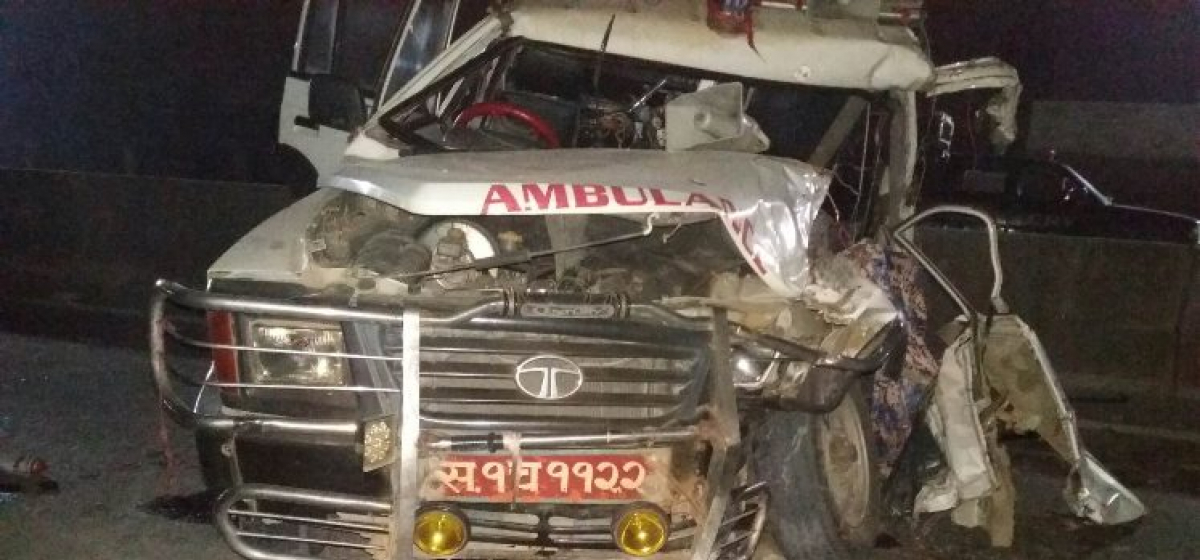KATHMANDU, May 20: The second wave of the novel coronavirus (COVID-19) disease has heavily affected the Kathmandu Valley. The populated valley sees hundreds of patients arriving at hospitals on a daily basis. However, due to the lack of intensive care units (ICUs), medical oxygen, and beds, the passing days faced by the sick and the doctors have become very challenging.
As stated by respiratory and chest disease expert of Civil Hospital, Dr Bidesh Bista, his experiences with the ongoing pandemic has been quite different compared to last year. Stationed at a COVID-ICU, every single day has become a challenge for him. He receives over a hundred phone calls from various people and his friends seeking help. But, the ICU ward in the hospital is filled with patients.
Dr Bista said that one of his friends had sought his help when his father was infected by COVID-19 but he didn't have any solution for him. His friend's father died two days later. Dr Bista has experienced many bitter experiences as such at the moment.
“I get phone calls saying they need ICU, but the lack of available medical wards have caused the death of many patients,” Dr Bista said. “I feel helpless despite being a doctor and am filled with regret.” “We don't even have time to express our sorrows for the patients we lost. Three of my friends who are also doctors have lost their fathers,” he said.
Tension runs high in Manipal Hospital after patient dies

“I get phone calls saying they need ICU, but the lack of available medical wards have caused the death of many patients,” Dr Bista said. “I feel helpless despite being a doctor and am filled with regret. We don't even have time to express our sorrows for the patients we lost.”
At the Sukraraj Tropical and Communicable Disease Hospital, the year has been painful for Dr Anup Bastola. In the past year, Dr Anup saw many senior citizens dying of COVID-19. This year, he witnessed many youths who died from the contagious disease. Many of the patients arriving at the hospital showed severe symptoms and were in need of ICU and ventilators which were all occupied. Medical staff at the hospital have not been able to rest nor take a leave because of the sudden influx of patients. “I feel deeply disturbed when a youth dies in an emergency room without reaching the ICU,” Dr Bastola said.
The hospitals in the capital have faced a bigger challenge due to the sudden rise of the COVID-19 infection, compared to last year. Dr Chakra Raj Pandey, director of Grande Hospital faced a similar experience. “The machines cannot run without oxygen, and COVID-19 patients need high flow of oxygen. We were forced to send the patients away but there was no place elsewhere either.” Dr Pandey said. “We had to face a situation where nothing could be done,” Pandey added.
During such times, many patients have lost their faith in hospitals which causes him constant pain. Five members of a relative’s family tested positive for the coronavirus but there was only one bed available. It was difficult for them to prioritize. A friend’s father died waiting for the ICU. Such experiences have deeply affected Dr Pandey. “I have learnt that the government alone cannot handle the pandemic. We cannot run away once a tragedy has occurred, we all have to come together in order to control this pandemic,” Dr Pandey said.
Dr Raju Pangeni, a doctor treating COVID-19 patients at Hams Hospital has a different story to tell. During the first wave of the pandemic, patients were able to breathe even while receiving less oxygen. However, due to the influx of young patients arriving due to low oxygen problems, the hospital was unable to provide either ICU or any medical oxygen. Also, “the second wave of the virus affects the body much faster which causes many patients to arrive at hospitals at once. The lack of care and treatment for the patients have caused many to die in wards,” he added.
“Patients at the ICU and wards were given priority according to their age group. Youth were given higher priority at the time,” Pangeni said. Death of relatives due to the lack of ventilators are common. Dr Pangeni said that his friend lost his parents when he could not help him. “I have to work even when I am filled with regrets inside,” he added. Many doctors are saddened by the death of patients who arrive late at the hospital. “Many patients could have been saved if they had arrived early at the hospital,” he said.
As for Dr Prabin Nepal, treatment coordinator for COVID-19 patients at the Armed Police Force Hospital, he has remained sad since the beginning of the pandemic. On the one hand, you have to work day and night to manage the patients, on the other, the hard work is meaningless. “It doesn't affect me much when a person who had received ICU and oxygen passes away, but when a person who did not receive oxygen and ICU dies, the pain is excruciating, '' he said. People come here with hopes of survival, but it makes me very unhappy when I can't manage oxygen when they ask for it.



































